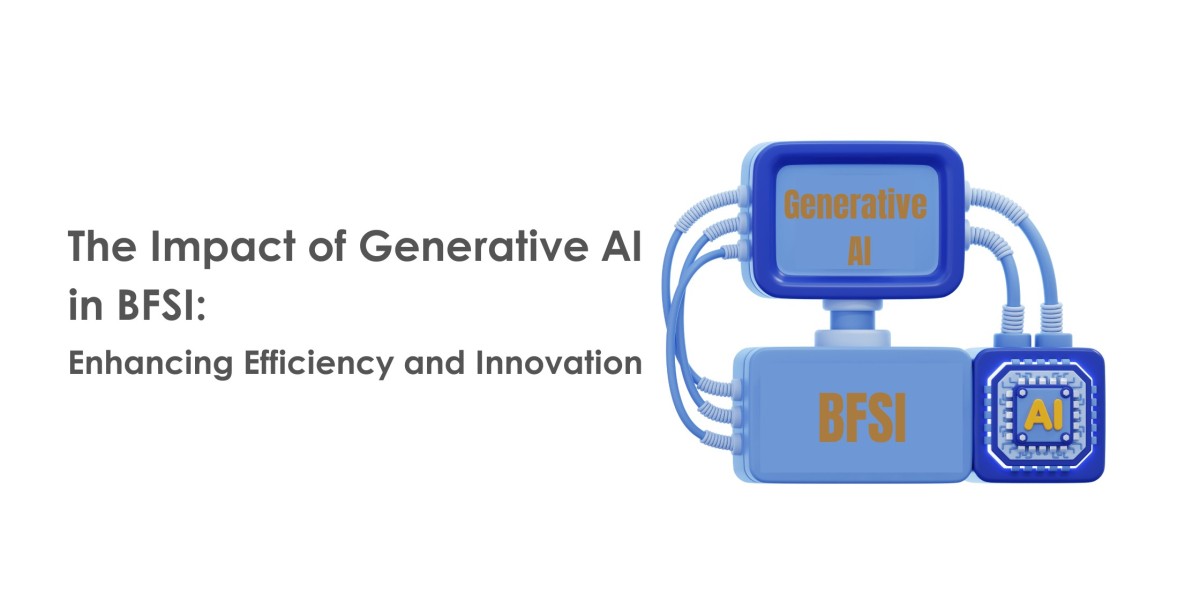In the ever-evolving landscape of Banking, Financial Services, and Insurance (BFSI), technology plays a pivotal role in shaping the future of the industry. Among the most transformative advancements is Generative AI in BFSI, which is revolutionizing how institutions operate, interact with customers, and manage risks. This blog explores the significant impact of Generative AI in BFSI, highlighting how it enhances efficiency and fosters innovation across the sector.
What is Generative AI?
Generative AI refers to a subset of artificial intelligence that focuses on creating new content, whether it's text, images, or data, by learning patterns from existing information. Unlike traditional AI, which primarily analyzes and predicts, Generative AI can produce novel outputs, making it a powerful tool for creative and operational applications in BFSI.
Enhancing Operational Efficiency
One of the primary benefits of Generative AI in BFSI is the substantial improvement in operational efficiency. Here's how it achieves this:
1. Automating Routine Tasks
Generative AI can automate repetitive and time-consuming tasks such as data entry, report generation, and compliance checks. By handling these mundane activities, AI frees up human employees to focus on more strategic and complex functions, thereby increasing overall productivity.
2. Streamlining Customer Onboarding
The customer onboarding process in BFSI often involves extensive documentation and verification steps. Generative AI can simplify this process by automating document analysis, verifying information, and generating personalized onboarding experiences. This not only speeds up the process but also reduces errors and enhances customer satisfaction.
3. Optimizing Financial Modeling
Financial institutions rely heavily on accurate modeling for investment strategies, risk assessment, and portfolio management. Generative AI can create sophisticated financial models by analyzing vast amounts of data, identifying patterns, and generating predictive insights. This leads to more informed decision-making and better financial outcomes.
Driving Innovation
Generative AI is not just about improving existing processes; it's also a catalyst for innovation in BFSI. Here’s how:
1. Personalized Financial Products
Generative AI enables the creation of highly personalized financial products tailored to individual customer needs and preferences. By analyzing customer data and behavior, AI can generate customized investment plans, insurance policies, and loan offers, enhancing customer engagement and loyalty.
2. Advanced Fraud Detection
Fraud remains a significant concern in the BFSI sector. Generative AI enhances fraud detection capabilities by generating and analyzing patterns of fraudulent activities. It can identify anomalies and predict potential fraud attempts with higher accuracy, enabling proactive measures to safeguard assets and maintain trust.
3. Enhanced Customer Support
AI-powered chatbots and virtual assistants, driven by Generative AI, provide 24/7 customer support with the ability to handle complex queries and generate accurate responses. These intelligent systems can learn from interactions, continuously improving their performance and offering a seamless customer experience.
Risk Management and Compliance
Generative AI plays a crucial role in risk management and regulatory compliance, two critical areas in BFSI:
1. Predictive Analytics for Risk Assessment
Generative AI leverages predictive analytics to assess risks by analyzing historical data and identifying potential future threats. This allows financial institutions to implement preemptive strategies, mitigate risks, and ensure stability.
2. Regulatory Compliance Automation
Compliance with ever-changing regulations is a constant challenge in BFSI. Generative AI can automate compliance processes by generating reports, monitoring transactions, and ensuring adherence to regulatory standards. This reduces the burden on compliance teams and minimizes the risk of non-compliance penalties.
Challenges and Considerations
While Generative AI offers immense benefits, its implementation in BFSI also comes with challenges:
1. Data Privacy and Security
Handling sensitive financial data requires stringent security measures. Ensuring data privacy and protecting against breaches are paramount when deploying Generative AI solutions in BFSI.
2. Integration with Existing Systems
Integrating AI technologies with legacy systems can be complex. Financial institutions must ensure seamless integration to maximize the benefits of Generative AI without disrupting existing operations.
3. Ethical and Responsible AI Use
Maintaining ethical standards and ensuring responsible AI use is crucial. BFSI institutions must address biases, ensure transparency, and uphold fairness in AI-driven decisions.
Future Prospects
The future of Generative AI in BFSI looks promising, with continuous advancements expected to further transform the industry. As AI technologies evolve, their integration into BFSI will become more sophisticated, driving greater efficiency, innovation, and customer satisfaction.
Conclusion
Generative AI in BFSI is revolutionizing the banking, financial services, and insurance sectors by enhancing operational efficiency, driving innovation, and improving risk management. Despite the challenges, the benefits far outweigh the hurdles, making Generative AI a vital component for the future of BFSI. Embracing this technology enables financial institutions to stay competitive, meet evolving customer demands, and achieve sustainable growth in a dynamic market landscape.



